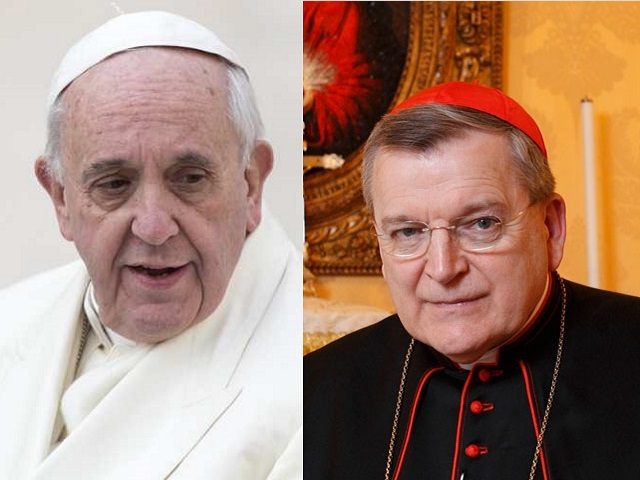Cardinal Raymond Burke has insisted that Pope Francis must clarify serious doctrinal doubts arising from his teaching letter Amoris Laetitia, or the Cardinal will be forced to initiate “a formal act of correction of a serious error.”
In September, four top Catholic cardinals including Burke wrote a private letter to Pope Francis asking him to clarify five serious doctrinal doubts proceeding from his 2016 apostolic exhortation Amoris Laetitia (The Joy of Love) concerning Holy Communion for the divorced and remarried, the indissolubility of marriage, and the proper role of conscience.
When the Pope failed to reply to the Cardinals’ letter, they proceeded to publish it online on Nov. 14, hoping to solicit a response.
In an interview with Edward Pentin of the National Catholic Register, Burke said that although it is “quite rare,” Catholic tradition allows for the practice of correction of the Roman Pontiff, something that may become necessary.
“But if there is no response to these questions, then I would say that it would be a question of taking a formal act of correction of a serious error,” he said.
Cardinal Raymond Burke is the former head of the Vatican’s Supreme Court and patron of the Sovereign Military Order of Malta. In his interview, he said that the purpose of the letter was not a political maneuver but an act of charity, unity, and pastoral concern.
Burke said that the Church “is suffering from a tremendous confusion on at least these five points” that have to do with “irreformable moral principles.”
“So we, as cardinals, judged it our responsibility to request a clarification with regard to these questions, in order to put an end to this spread of confusion that is actually leading people into error,” he said.
Addressing the question of marriage, Burke said that the Church teaches that marriage is indissoluble and therefore, if you are divorced, “you may not enter a marital relationship with another person unless the indissoluble bond to which you are bound is declared to be null, to be nonexistent.”
Burke took the occasion to criticize the position of German Cardinal Walter Kasper, a progressive “who holds that marriage is an ideal to which we cannot realistically hold people.”
He also insisted that “we are simply setting forth what the Church has always taught and practiced in asking these five questions that address the Church’s constant teaching and practice.”
“The answers to these questions provide an essential interpretative tool for Amoris Laetitia,” he said. “They have to be set forth publicly because so many people are saying: ‘We’re confused, and we don’t understand why the cardinals or someone in authority doesn’t speak up and help us.’”
Burke also stated that the four cardinals wrote the letter “with the greatest sense of our responsibility as bishops and cardinals,” but also “with the greatest respect for the Petrine Office [of the Pope], because if the Petrine Office does not uphold these fundamental principles of doctrine and discipline, then, practically speaking, division has entered into the Church, which is contrary to our very nature.”
Burke further noted that as “the chief advisers to the Pope,” cardinals are obliged to offer him their counsel, especially on serious matters. “For us to remain silent about these fundamental doubts, which have arisen as a result of the text of Amoris Laetitia, would, on our part, be a grave lack of charity toward the Pope and a grave lack in fulfilling the duties of our own office in the Church,” he said.
If the Pope were to teach grave error or heresy, the Cardinal said, it is the duty of cardinals and bishops “to make clear that the Pope is teaching error and to ask him to correct it.”
Follow Thomas D. Williams on Twitter Follow @tdwilliamsrome.

COMMENTS
Please let us know if you're having issues with commenting.